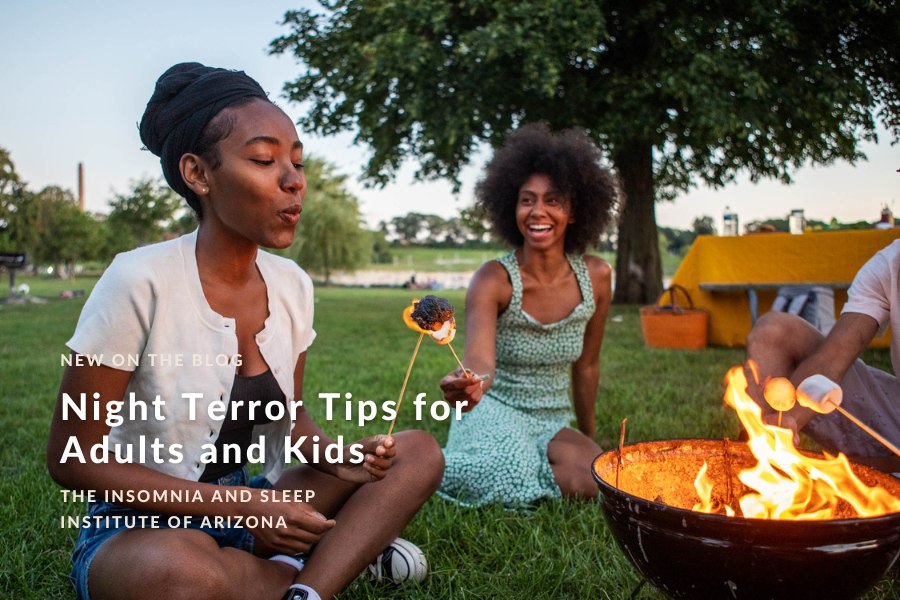Night terrors are a relatively rare disorder that can present in both children and adults—kids often outgrow their night terrors, but as a parent there is still much you can do to optimize their safety. The Insomnia and Sleep Institute of Arizona works with patients as young as two years old to address all types of sleep disorders. Night terrors in particular can cause serious and even fatal injuries. This often happens when a patient is trying to “fight” in their sleep or “escapes” from their bed. Night terrors present as screaming, panicking, and thrashing during sleep. They are not the same as nightmares because they happen in a different part of the sleep cycle and cause the person to act out much more aggressively. For those who sleep alone, particularly adults, it can be difficult to know if you have any sleep disorder, including night terrors. Typically, a person discovers they have night terrors because someone—a bedmate or parent—notices it.
Night Terrors vs. Nightmares
Night terrors are a type of parasomnia sleep disorder that leads to abnormal sleep behaviors. This disorder can be triggered most often by stress, sleep deprivation, and fevers. Nightmares happen during REM sleep, but night terrors happen during non-REM (the first half of the sleep cycle). Although it may seem otherwise, night terrors aren’t actually a dream. Most people wake up during a nightmare at some point, but you’ll stay asleep during night terrors. These events can last 10 – 40 minutes on average, in which several symptoms may present.
Shouting, kicking, and thrashing are the most common presentations of night terrors. The person might have their eyes open, and when they do they look terrified. You may notice a racing pulse, sweating, and heavy breathing. Some patients get out of bed and run, and may be aggressive. It is difficult to wake up from a night terror (or to wake someone up) but once this happens the person often has little or no memory of the event. Keep in mind that, as a parent, it can also be dangerous for you to try to wake up a child in the midst of a night terror. The goal, instead, is to keep them safe. Those with night terror should sleep in a space that has no clutter, sharp object, or ideally windows or stairs nearby.
Night Terrors and Children
If a child doesn’t outgrow night terrors, they may need treatment beyond lifestyle changes and shifts in their environment. Night terrors can also be triggered by post-traumatic stress disorder, some medical conditions that interact with sleep like restless leg syndrome or sleep apnea, previous traumatic brain injuries, or emotional stressors in life such as conflict. Some mood conditions, such as anxiety and depression, can also bother sleep and trigger or exacerbate night terrors. There is also a genetic component to night terrors, so if you (as a parent) or someone in your family has night terrors, your children may be more likely to develop them.
In children, about 1 – 7 percent will exhibit night terrors (compared to just 2 percent of adults). Adults can sometimes remember some details of the episode, but children usually don’t remember anything. Changing medications, new sleep environments, or having caffeine before bed can also trigger nightmares in children—especially toddlers. Thus, eliminating triggers when possible is critical. It is also important to address any underlying medical conditions that may be causing or worsening night terrors. Good sleep habits or seeing a therapist in conjunction with a sleep therapist is a must for anyone with night terrors. You can also explore anticipatory awakening by identifying if there are certain times night terrors occur and scheduling an alarm 15 minutes prior. This is helpful for some to avoid night terrors, and parents can wake up their children at this time.
Finally, there are medications that work for some patients. The most common are sedatives and benzodiazepines, or even melatonin. However, many people understandably want to look to pharmaceuticals as a last approach. Keep in mind that if night terrors occur more than once per week, disrupt your waking hours, or put the person or others in harm, it is crucial to get help immediately. The Insomnia and Sleep Institute is available to help you or your child with night terrors. Call the clinic during opening hours or simply complete the online contact form now.





